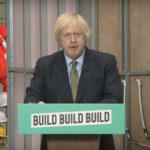Prime Minister promises “New Deal” which delivers jobs, skills and infrastructure for Britain. In a speech in the West Midlands today, Boris Johnson set out the first step in government plans to “build back better” in the wake of coronavirus, for the benefit of every corner of the country. The PM also announced radical reforms to the planning system that government believes will make it easier to build better homes where people want to live.
In his speech, the Prime Minister underlined his commitment to ‘build, build, build’ in order to upgrade Britain’s infrastructure and skills to fuel economic recovery across the UK, announcing an investment of £5bn.
The Prime Minister announced that government will bring forward £5bn of capital investment projects, supporting jobs and the economic recovery, including:
- £1.5bn this year for hospital maintenance, eradicating mental health dormitories, enabling hospital building, and improving A&E capacity. This will improve patient care, make sure NHS hospitals can deliver world-leading services and reduce the risk of coronavirus infections.
- £100m this year for 29 projects in our road network to get Britain moving, from bridge repairs in Sandwell to boosting the quality of the A15 in the Humber region. Plus £10m for development work to unblock the Manchester rail bottleneck, which will begin this year.
- Over £1bn to fund the first 50 projects of a new, 10-year school rebuilding programme, starting from 2020-21. These projects will be confirmed in the Autumn, and construction on the first sites will begin from September 2021.
- £560m and £200m for repairs and upgrades to schools and FE colleges respectively this year.
- £142m for digital upgrades and maintenance to around 100 courts this year, £83m for maintenance of prisons and youth offender facilities, and £60m for temporary prison places, creating thousands of new jobs.
- £900m for a range of ‘shovel ready’ local growth projects in England over the course of this year and next, as well as £96m to accelerate investment in town centres and high streets through the Towns Fund this year. This will provide all 101 towns selected for town deals with £500k-£1m to spend on projects such as improvements to parks, high streets, and transport.
To support the ambition to ‘build build build’, in the Autumn government will publish a National Infrastructure Strategy which will set a clear direction on core economic infrastructure, including energy networks, road and rail, flood defences and waste.
The Government also intends to bring forward funding to accelerate infrastructure projects in Scotland, Wales, and Northern Ireland — saying it will work with the devolved administrations to identify where it can get spades in the ground, build our communities, and create jobs faster for citizens across the United Kingdom. Government will carry out a review to look at how best to improve road, rail, air and sea links between the four nations to create a more connected kingdom.
Investment good news for people and industry
Commenting on the announcement, ECA CEO Steve Bratt said: “This substantive commitment to infrastructure investment is good news for both citizens and our industry. Government spending will help drive the industry to recovery following the recent pandemic and lockdown.
“Furthermore, with many firms either struggling to survive or holding back their own investment plans, this major investment will help protect jobs and the viability of small businesses.
“ECA also strongly supports the need for green infrastructure investment, and will be holding the Government to account on their plans in this area. Decarbonising transport and buildings both remain fundamental to meeting our legal climate targets, as well as delivering a more sustainable future.”
The Government also recently announced plans for a more collaborative approach to procurement and outsourcing, based around value rather than cost.
ECA Director of Legal and Business Rob Driscoll added: “The injection of Government spend into infrastructure is the first of a number of strategic steps within the CLC roadmap to ‘restart’ the industry economy.
“Inevitably as infrastructure moves forward, this will lead to a consequential rise in commercial construction and FM.
“ECA will work with CLC and Government to ensure that the value (rather than cost) procurement models used to implement this pipeline embeds the fairer and collaborative contractual and payment practices CLC is targeting to re-set and re-invent our economy to the benefit of SME inclusion.”
Planning reforms
Boris Johnson also announced the most radical reforms to the planning system since the Second World War, which are intended to make it easier to build better homes where people want to live. The new regulations will give greater freedom for buildings and land in town centres to change use without planning permission and create new homes from the regeneration of vacant and redundant buildings.
Under the new rules, existing commercial properties, including newly vacant shops, can be converted into residential housing more easily, in a move to kick start the construction industry and speed up rebuilding. The changes include:
- More types of commercial premises having total flexibility to be repurposed through reform of the Use Classes Order. A building used for retail, for instance, would be able to be permanently used as a café or office without requiring a planning application and local authority approval. Pubs, libraries, village shops and other types of uses essential to the lifeblood of communities will not be covered by these flexibilities.
- A wider range of commercial buildings will be allowed to change to residential use without the need for a planning application.
- Builders will no longer need a normal planning application to demolish and rebuild vacant and redundant residential and commercial buildings if they are rebuilt as homes.
- Property owners will be able to build additional space above their properties via a fast track approval process, subject to neighbour consultation.
These changes, which are planned to come into effect by September through changes to the law, government believes will both support the high street revival by allowing empty commercial properties to be quickly repurposed and reduce the pressure to build on green field land by making brownfield development easier. Developers will still need to adhere to high standards and regulations, just without what the Government sees as unnecessary red tape.
Boris Johnson said: “We will build fantastic new homes on brownfield sites and other areas that with better transport and other infrastructure could, frankly, be suitable and right for development.
“And we will address that intergenerational injustice and help young people get on the housing ladder in the way that their parents and grandparents could.
“And it’s to galvanise this whole process that this government will shortly bring forward the most radical reforms most radical reforms of our planning system, since the end of the Second World War.”
The Prime Minister posed the question: “Why are we so slow building homes by comparison with other European countries? In 2018 we built 2.25 homes per 1,000 people. Germany managed 3.6, the Netherlands 3.8, France 6.8.
“I’ll tell you why — because time is money. And the new counting delays in our system are a massive drag on the productivity and the prosperity of this country.
“So we will build better and build greener, but we will also build faster.”
The Prime Minister also announced that work will begin to look at how land owned by the Government can be managed more effectively.
Ahead of the Spending Review, a new, ambitious cross-government strategy will look at how public sector land can be managed and released so it can be put to better use. This would include home building, improving the environment, contributing to net zero goals and injecting growth opportunities into communities across the country.
These announcements come alongside a package of measures to support home building across England. These include:
- A £12bn affordable homes programme that will support up to 180,000 new affordable homes for ownership and rent over the next 8 years, confirmed today.
- Included in the affordable homes programme will be a 1,500 unit pilot of ‘First Homes’: houses that will be sold to first time buyers at a 30% discount which will remain in perpetuity, keeping them affordable for generations of families to own.
- Funds from the £400m Brownfield Land Fund have today been allocated to the West Midlands, Greater Manchester, West Yorkshire, Liverpool City Region, Sheffield City Region, and North of Tyne and Tees Valley to support around 24,000 homes.
- The Home Builders Fund to help smaller developers access finance for new housing developments will receive additional £450m boost. This is expected to support delivery of around 7,200 new homes.
It was also announced that the Government will launch a planning Policy Paper in July setting out its plan for comprehensive reform of England’s seven-decade old planning system, to introduce a new approach that works better for our modern economy and society.
Later this year, government will also bring forward a Local Recovery White Paper detailing how the UK government will partner with places across the UK to build a sustainable economic recovery, launch our National Infrastructure Plan and legislate for wider de-regulatory reforms.
The Prime Minister concluded: “If we deliver this plan together, then we will together build our way back to health. We will not just bounce back, we will bounce forward — stronger and better and more united than ever before.”
UKGBC responds to PM’s ‘Build Build Build’ speech
Responding to Prime Minister Boris Johnson’s speech outlining plans for the post-COVID economic recovery, Julie Hirigoyen, Chief Executive at The UK Green Building Council (UKGBC) said: “We asked for ‘Build Back Better’, but what we’ve got is ‘Build Build Build’.
“If we do not seize this moment, and take the opportunity to underpin our recovery plans with climate ambition, we will not achieve our target of net zero emissions by 2050. Yet the plans announced by the PM today make no reference to energy efficiency — perhaps the most urgent of all infrastructure priorities — that can create jobs right around the country, improve health and reduce costs to NHS, and increase consumer spending power by lowering energy bills. All this despite universal support for a national retrofit strategy over the past few weeks from wide ranging industry and academic institutions, and a 2019 manifesto promise of £9bn in insulating our draughty homes.
“We welcome a focus on levelling up the fortunes of individuals right across the country through investment in new homes and infrastructure, but a frenzy of building is not equivalent to building back greener. Such investment must be underpinned by the highest quality outcomes including efficiency, net zero emissions, waste avoidance, social value and biodiversity net gain. Yet on the basis of current Building Regulations and planning standards, none of these outcomes would be guaranteed.
“I sincerely hope that the Chancellor’s budget announcement next week will provide much-needed detail on the way this Government will practically ‘build back better’.”
Importantance of infrastructure in kickstarting economic recovery
Jacqueline Hughes, Senior Risk Analyst at Equib, which specialises in advising on major-scale infrastructure projects, said: “This decision to accelerate infrastructure spending underlines the important role it can play in kickstarting economic recovery. However, a longer-term strategy is still needed.
“Working at speed brings challenges, which will require careful project management. In particular, project teams will need to balance the need to adhere to Covid-19 constraints, with the need to deliver buildings that are fit for purpose, as quickly as possible.
“Speeding up the delivery of infrastructure projects must not lead to corners being cut. There are several potential issues here — for example, if procurement procedures are circumvented or abbreviated in some way, this could mean taxpayers don’t get value for money. Early-stage workshops must also be thorough, ensuring there is input from contractors, to avoid the need for costly delays or re-designs at a later stage.
“This is a chance for the UK construction industry to put past lessons to good use and drive national economic recovery.”









